SONGS OF THE FOREIGN LEGION AS AN EDUCATIONAL RESOURCE IN THE PROCESS OF LEARNING FRENCH
DOI:
https://doi.org/10.33216/2220-6310/2024-109-2-140-149Keywords:
language learning, historical and geographical space, French as a foreign language, Foreign Legion, linguistic pragmatics, sense of belongingAbstract
The article examines the situation of language learning in a special context. The Foreign Legion, which was created in the early 19th century, is unique in that it brings together men from all over the world and trains them in a short period of time to become part of an elite army corps. One of the key aspects of this training is the study of French, which has to meet specific requirements and goals. On the one hand, the language conveys the cultural and social values specific to the Legion group, and on the other hand, it must provide the linguistic tools necessary to carry out the missions that the future Legionnaire will undertake. These two orientations are based on a pragmatic vision of language learning and an extremely strong sense of belonging to a particular community.
In our study, we will first present the socio-cultural environment of the Foreign Legion and then analyse the didactic content of the brochure Chants de la Légion étrangère (2018) to show how the relationship between language and environment fully meets the Legion's pragmatic goals. The environment here should be understood in its historical, geographical and cultural dimensions, as an element of social structuring. By analysing a number of songs, we will explore how French language learning and the assimilation of legionnaire values are simultaneously taking place and show how the synergy between language and context plays an important role in language learning with a specific mission (training future combatants), which cannot be separated from the sense of belonging to family, community or country. It is therefore clear that while songs contribute to language learning, they also play an important role in the integration and incorporation of the future legionnaire. The pragmatic goal of cohesion is confirmed by singing, which also allows for the expression of cohesion, pride and determination of the troops.

